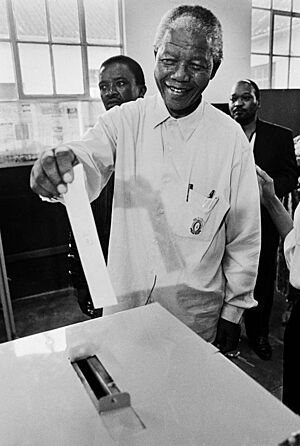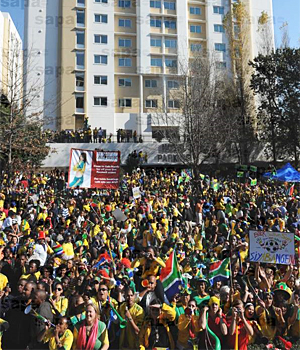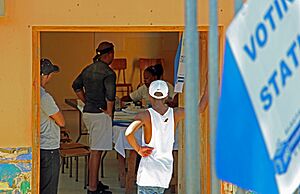History of South Africa (1994–present) facts for kids
South Africa has changed a lot since 1994. Before that, the country had a system called apartheid, which separated people based on their race. In 1994, South Africa had its first truly democratic election, where everyone could vote. This election brought the African National Congress (ANC) party to power. The ANC has won every election since then, in 1999, 2004, 2009, 2014, and 2019. Young people born after 1994 are sometimes called the born-free generation. Many of them voted for the first time in 2014.
Contents
Mandela's Time as President (1994–1999)
After the election on April 27, 1994, Nelson Mandela became the President of South Africa. He formed a special government called the Government of National Unity. This government included people from different political parties, like the ANC, the National Party, and the Inkatha Freedom Party. Thabo Mbeki and F.W. de Klerk became deputy presidents.
The new government started a plan called the Reconstruction and Development Programme (RDP). This plan aimed to fix the problems caused by apartheid, like helping people out of poverty and improving important services across the country.
In 1995, South Africa got a new constitution. The government also set up the Truth and Reconciliation Commission (TRC). The TRC's job was to learn about the unfair things that happened during the apartheid era. Many people shared their difficult stories, which helped the country begin to heal. The commission allowed victims to tell their experiences. It also allowed people who had done wrong things to confess, hoping to bring some peace and understanding.
In 1996, the government adopted an economic plan called the Growth, Employment and Redistribution (GEAR) strategy. This plan aimed to manage the country's money carefully and improve the economy.
A very special moment happened in 1995 when South Africa hosted and won the 1995 Rugby World Cup. Nelson Mandela wore the national rugby team's jersey when he gave the trophy to the South African captain, Francois Pienaar. This was a powerful symbol of unity and healing for the country.
Mbeki's Time as President (1999–2008)
In 1999, South Africa held its second election where people of all races could vote. The ANC won again, and Thabo Mbeki became the country's second black president.
During Mbeki's presidency, there were some big challenges. The country faced significant health issues. There were also questions about his deputy, Jacob Zuma, which led to Zuma being removed from his position.
The government also started a program called Black Economic Empowerment (BEE) in 2003. This program aimed to help people who were unfairly treated during apartheid get more opportunities in business. It was later improved and called Broad-Based Black Economic Empowerment.
Crime was a major concern in South Africa during this period. The government worked to reduce crime rates. Some South Africans also chose to move to other countries during these years.
Mbeki's Resignation
In 2007, there was a big change within the ANC party. Thabo Mbeki lost the leadership election to his former deputy, Jacob Zuma. Because of this, Mbeki was asked to step down as president of the country. He resigned on September 21, 2008.
Motlanthe's Time as President (2008–2009)
After Mbeki resigned, Kgalema Motlanthe was chosen to be president on September 25, 2008. The ANC said that Motlanthe would be a "caretaker" president until the next election in April 2009. Jacob Zuma was the ANC's candidate for president in that election.
Some members of the ANC were unhappy after Mbeki left. They decided to form a new political party called the Congress of the People (COPE).
Zuma's Time as President (2009–2018)
In the 2009 election, the ANC won again, but with a slightly smaller majority. Jacob Zuma became president on May 9, 2009. The Democratic Alliance (DA) became the main opposition party.
A very exciting event happened in 2010: South Africa hosted the 2010 FIFA World Cup. This was the first time the World Cup was held in Africa, and it was a proud moment for the country.
The 2014 election was also won by the ANC. The DA continued to grow as the main opposition. A new party, the Economic Freedom Fighters (EFF), led by Julius Malema, also entered parliament. The EFF focuses on issues like land reform and helping ordinary people.
Zuma's Resignation
Towards the end of his time as president, Jacob Zuma faced increasing pressure to resign. After many discussions within the ANC, he announced his resignation on February 14, 2018.
Ramaphosa's Time as President (2018–Present)
After Zuma resigned, Cyril Ramaphosa of the ANC became the new President of South Africa on February 15, 2018.
In 2018, the South African Parliament discussed changing the constitution to allow land to be taken for public use without payment in some cases. This was to address historical inequalities in land ownership. A government study in 2017 showed that most private farmland was owned by white people, who are a smaller part of the population.
In May 2019, the ANC, led by President Ramaphosa, won the parliamentary election again. However, their majority was slightly reduced. The DA remained the main opposition, and the EFF came in third place.
Challenges and Changes in South Africa
After apartheid ended, many skilled white South Africans moved to other countries like Australia, New Zealand, and the United Kingdom.
The new government also had to deal with a large amount of foreign debt from the apartheid era. This debt was finally paid off in 2001.
Another big challenge was the HIV-AIDS epidemic. South Africa had many people affected by the disease. The government worked to provide treatment, which helped save many lives.
The mining industry in South Africa has always been important. In 2012, there was a sad event called the Marikana massacre, where police shot striking miners. This highlighted ongoing issues in the mining sector.
By 2014, many South Africans, especially black South Africans, still lived in poverty. This made South Africa one of the most unequal countries in the world. People were often unhappy with the slow pace of change and government issues, leading to many public protests.
The ANC had promised to share the country's wealth more fairly, but after winning the election, they adopted different economic policies. This meant that some of the original plans to help people out of poverty, like taking over mines and banks, were not put into action.
Images for kids
 | William Lucy |
 | Charles Hayes |
 | Cleveland Robinson |





